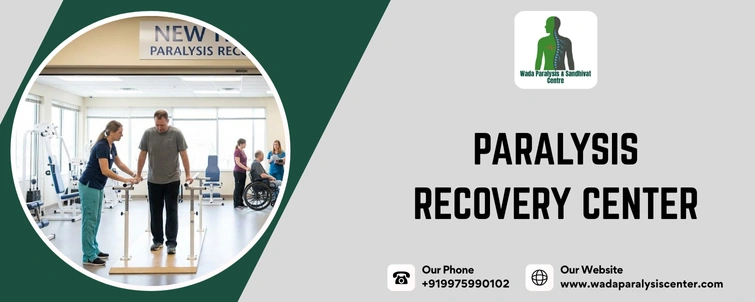



Table of Contents
ToggleParalysis is one of the most debilitating conditions that can drastically impact a person’s quality of life. For patients and families facing this challenge, finding the right medical institution dedicated to rehabilitation and recovery is essential. The Paralysis Recovery Center at Wada stands out as a specialized facility offering advanced therapeutic approaches, personalized care, and comprehensive recovery programs for patients suffering from paralysis due to stroke, spinal cord injury, or neurological disorders.
This blog explores how the Paralysis Recovery Center at Wada represents a beacon of hope for individuals striving to regain independence and mobility through expert medical care and rehabilitation.
Paralysis refers to the loss of muscle function in one or more parts of the body, often caused by damage to the nervous system. Depending on the cause and severity, paralysis can be partial, complete, temporary, or permanent. The condition affects not only physical movement but also emotional and mental well-being.
At the Paralysis Recovery Center, specialists work closely with patients to assess their level of paralysis and design targeted recovery programs. Whether a person has suffered a brain stroke leading to hemiplegia (paralysis of one side of the body), a spinal cord injury resulting in paraplegia (waist down paralysis), or quadriplegia (paralysis of all four limbs), the center adopts an integrated therapeutic approach for each case.
The Paralysis Recovery Center at Wada was established with a clear mission: to restore health, confidence, and independence for individuals affected by paralysis. The center’s philosophy revolves around patient-centered rehabilitation, where every treatment plan is designed considering the unique physical condition, medical history, and emotional state of the patient.
With an infrastructure equipped with advanced physiotherapy technologies, neurological diagnostic tools, and experienced rehabilitation specialists, the center has become a trusted destination for paralysis treatment and recovery across Maharashtra and beyond.
The Paralysis Recovery Center handles a wide range of cases originating from diverse causes. Each cause requires specialized therapy and long-term management. The key conditions treated include:
Each patient arriving at the Paralysis Recovery Center undergoes detailed assessment to identify the exact cause and the most effective recovery route.
At the Paralysis Recovery Center, the emphasis is not just on treating paralysis symptoms but also on promoting full functional independence. The treatment approach combines various therapies, medical interventions, and lifestyle modifications tailored to each patient’s needs.
Physiotherapy plays a crucial role in restoring movement and muscle strength. Advanced equipment such as robotic rehabilitation systems, electrotherapy devices, and hydrotherapy facilities are used to aid progressive improvement. Experienced physiotherapists guide patients through customized exercise routines that focus on coordination, flexibility, and balance improvement.
Occupational therapy helps patients relearn daily activities like dressing, eating, and writing. Therapists at the Paralysis Recovery Center use adaptive training and assistive tools to enhance independence in everyday life.
Many paralysis patients, especially those recovering from stroke, experience difficulty speaking or swallowing. The center’s expert speech therapists implement specific cognitive-linguistic therapy programs to restore communication abilities.
Rehabilitation is as much about mental healing as it is physical recovery. The Paralysis Recovery Center provides counseling services to help patients and families manage emotional stress, anxiety, depression, and adjustment to new life changes.
Proper nutrition is critical for recovery. Dietitians design personalized dietary plans that help strengthen muscles, improve brain health, and support the healing process.
In addition to conventional treatments, the Paralysis Recovery Center incorporates complementary methods such as acupuncture, electrostimulation therapy, and ayurvedic rehabilitative care for enhanced outcomes.
Timing is crucial in paralysis recovery. The Paralysis Recovery Center strongly advocates early rehabilitation, which has been proven to maximize neurological recovery. Patients who begin therapy soon after their diagnosis or injury often regain mobility faster and reduce long-term disability risks.
The center’s early rehabilitation protocol involves rapid physiological evaluation, immediate physiotherapeutic intervention, and continuous monitoring of progress through diagnostic imaging and motion tracking systems.
Wada’s Paralysis Recovery Center is equipped with facilities comparable to leading neuro-rehabilitation hospitals in Maharashtra. Some prominent features include:
The combination of advanced medical technology and personalized human care makes the Paralysis Recovery Center a standout facility for neurological rehabilitation.
The center’s success stems from its multidisciplinary team of doctors, physiotherapists, neurologists, and rehabilitation specialists. Each member of the team has years of experience dealing with paralysis cases and contributes uniquely to patient recovery.
Key members of the team include:
Every specialist collaborates closely, ensuring a holistic and coordinated care plan for patients at the Paralysis Recovery Center.
No two paralysis cases are the same, and that’s why the Paralysis Recovery Center at Wada emphasizes custom-tailored rehabilitation programs. Before initiating therapy, detailed evaluations are conducted to determine muscle response, sensory feedback, and coordination levels.
Based on these findings, the team develops:
This structured goal-oriented method ensures measurable progress and keeps patients motivated throughout their recovery journey.
Over the years, the Paralysis Recovery Center has witnessed remarkable success stories where patients have regained strength and functionality they once thought impossible. Many stroke survivors have returned to normal life, spinal injury patients have achieved mobility with supportive therapy, and those suffering from severe neurological paralysis have rebuilt their independence step by step.
Families of patients frequently express gratitude for the center’s compassionate approach and consistent motivation. These real-life stories demonstrate the center’s commitment to transforming lives through expert rehabilitation.
Recovery doesn’t end when physical rehabilitation is complete. The Paralysis Recovery Center provides post-discharge programs that include home exercise routines, periodic medical checkups, and tele-rehabilitation sessions for continuous support.
Patients and families are educated on preventive care to avoid relapse and maintain long-term health. The follow-up sessions ensure that improvements continue even after the patient returns home.
Choosing the right rehabilitation facility is a vital decision when dealing with paralysis. Here’s why Wada’s Paralysis Recovery Center is one of the most recommended choices:
The combination of advanced medicine, human empathy, and customized recovery makes this center a trusted choice for paralysis patients.
The Paralysis Recovery Center bases its treatment on principles of neuroplasticity — the brain’s ability to reorganize itself by forming new neural connections. This scientific principle allows recovery even after critical brain or spinal injuries.
Therapists encourage repetitive movement, cognitive stimulation, and sensory feedback to help the nervous system “relearn” function. Techniques like constraint-induced therapy, mirror therapy, and gait re-education all leverage this concept to rewire the brain for mobility and coordination.
Located in a serene area of Wada, the Paralysis Recovery Center provides a peaceful environment conducive to healing. The center features:
The facility prioritizes comfort, dignity, and overall patient experience throughout the recovery process.
While medical rehabilitation is central, the Paralysis Recovery Center integrates holistic approaches like yoga therapy, meditation, and pranayama (breathing exercises) to support neurological recovery. These practices strengthen mental focus, reduce stress, and boost body awareness, which are critical during the rehabilitation journey.
Combining traditional wellness therapies with scientific treatment ensures complete mind-body restoration.
Beyond treatment, the Paralysis Recovery Center plays a significant role in community education. The team regularly conducts awareness programs and medical camps focusing on stroke prevention, spinal safety, and early paralysis intervention.
The center also collaborates with local hospitals, NGOs, and rehabilitation networks to extend outreach services, offering hope and guidance to underserved populations affected by paralysis.
With advancements in neuro-rehabilitation technologies, the Paralysis Recovery Center continues to expand its capabilities. Future initiatives include AI-powered rehabilitation analytics, robotic exoskeleton therapy, and virtual tele-rehab applications to make quality care accessible even from home.
The vision is to establish the Wada center as a national leader in paralysis recovery, providing world-class facilities and pioneering therapeutic frameworks that redefine rehabilitation in Maharashtra.

Wada Paralysis Center offers Ayurvedic and Panchakarma therapies designed to help patients recover from paralysis, nerve weakness, and mobility issues naturally.
Yes, Ayurvedic treatment focuses on restoring nerve functions, improving blood circulation, and balancing the body’s energy to promote natural recovery from paralysis.
The recovery period varies depending on the patient’s condition and severity of paralysis. Most patients begin noticing positive changes within a few weeks of regular treatment.
Yes, each patient receives a customized treatment plan after a detailed diagnosis based on their health condition and medical history.
All therapies at Wada Paralysis Center use 100% natural Ayurvedic oils, herbs, and techniques, ensuring safe and side-effect-free recovery.
Yes, the center provides comfortable stay facilities for patients coming from different cities for long-term treatment.
Yes, Ayurvedic therapies at Wada Paralysis Center are highly beneficial for post-stroke paralysis recovery and improving limb movement.
You can book an appointment by calling the center directly or visiting the Wada Paralysis Center’s official website for online consultation and bookings.
The Paralysis Recovery Center at Wada stands as a shining example of how dedication, expertise, and innovation can transform lives affected by paralysis. With personalized rehabilitation, advanced technology, and compassionate care, the center empowers individuals to reclaim mobility, confidence, and independence.
For families seeking trusted medical support and hope after paralysis, the Paralysis Recovery Center at Wada offers not only clinical excellence but also emotional strength, ensuring that no patient ever faces their journey alone.
